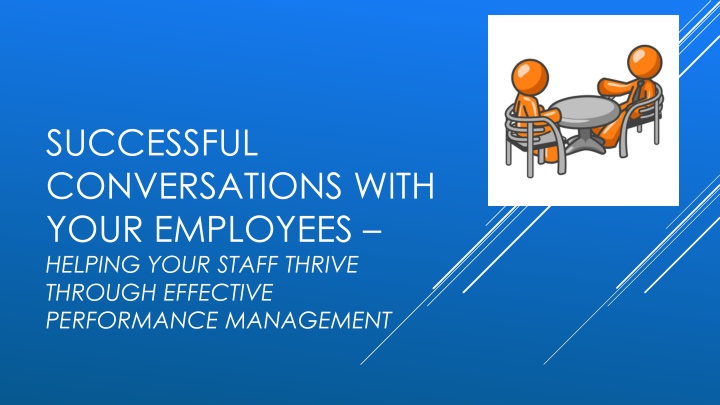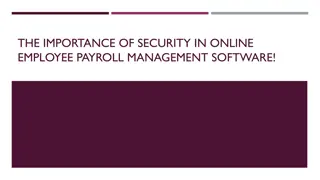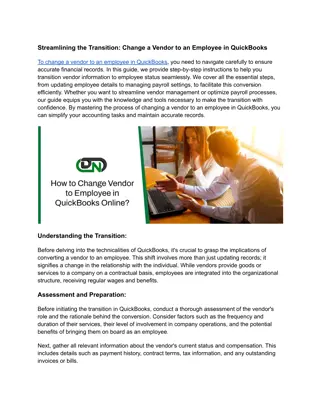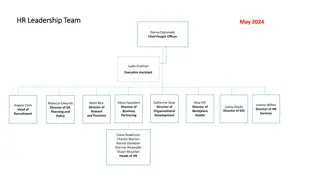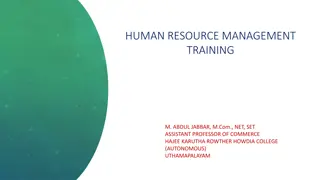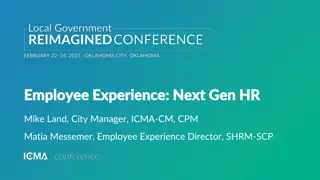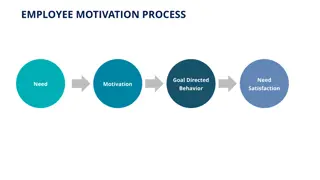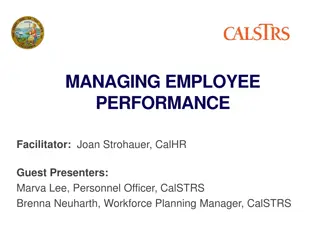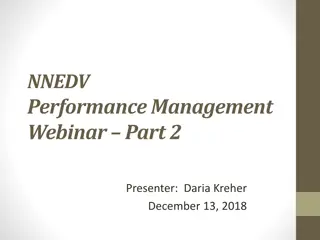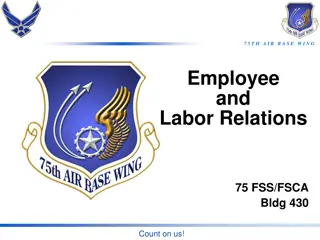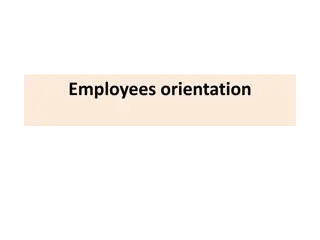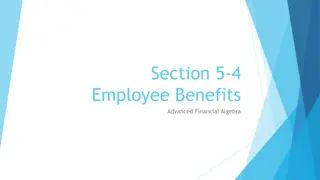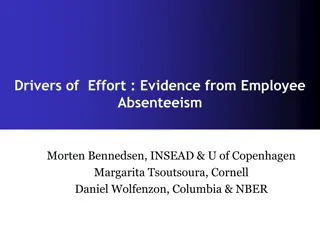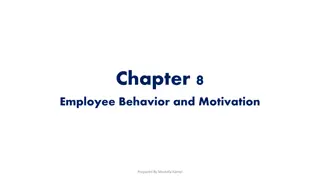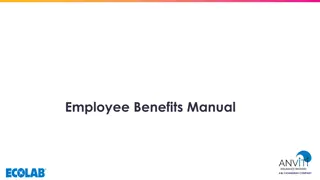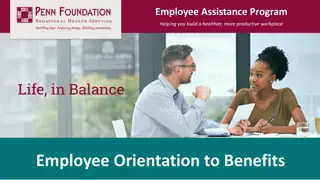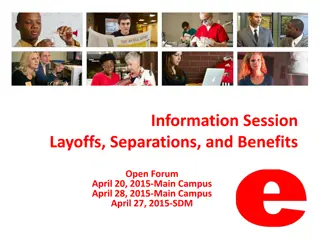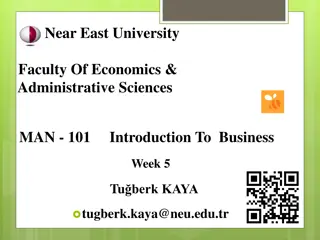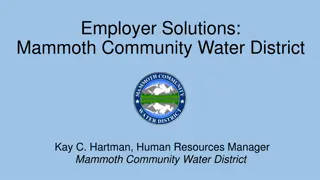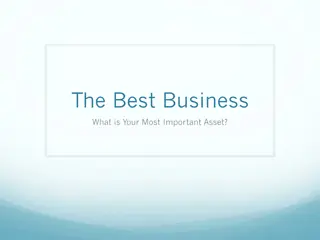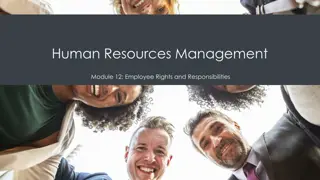Empowering Employee Performance: Effective Performance Management Strategies
In an organizational setting, successful performance management involves regular, meaningful conversations between managers and employees to enhance productivity and engagement. This process at UC encompasses feedback, goal setting, accountability, and skill development to drive success. By prioritizing ongoing feedback, realistic goal setting, and continuous engagement, managers play a pivotal role in fostering a culture of achievement and growth within their teams.
Download Presentation

Please find below an Image/Link to download the presentation.
The content on the website is provided AS IS for your information and personal use only. It may not be sold, licensed, or shared on other websites without obtaining consent from the author.If you encounter any issues during the download, it is possible that the publisher has removed the file from their server.
You are allowed to download the files provided on this website for personal or commercial use, subject to the condition that they are used lawfully. All files are the property of their respective owners.
The content on the website is provided AS IS for your information and personal use only. It may not be sold, licensed, or shared on other websites without obtaining consent from the author.
E N D
Presentation Transcript
SUCCESSFUL CONVERSATIONS WITH YOUR EMPLOYEES HELPING YOUR STAFF THRIVE THROUGH EFFECTIVE PERFORMANCE MANAGEMENT
UC BUDGET UC BUDGET- - 18.4 BILLION IN PAYROLL 18.4 BILLION IN PAYROLL OPERATING REVENUES- $26.7 BILLION EVERYTHING ELSE PAYROLL* *Wages, benefits & pension
PERFORMANCE MANAGEMENT = PERFORMANCE MANAGEMENT = EMPLOYEE ENGAGEMENT EMPLOYEE ENGAGEMENT 7 out of 10 7 out of 10 employees are not not actively engaged when managers don t hold them accountable them accountable for performance engaged don t hold Gallop.com 3x 3x When managers regularly meet regularly meet with employees about performance, employees engagement triples Gallop.com
PERFORMANCE MANAGEMENT AT UC People management is a critical skill and is increasingly important Pace of change rapidly increasing and won t slow down Giving feedback and holding people accountable are the foundations of performance management Once is not enough feedback needs to be ongoing throughout the year Managers need to learn how to set realistic goals that are adjusted as priorities shift Goals should provide motivation and focus 5
What is Successful What is Successful Performance Management? Performance Management? Employees who have regular and meaningful performance management discussions with their managers are more productive and have more opportunities to do challenging work and learn new skills Performance Management is a key responsibility for managers. There should be no surprises employees should know how they are doing every day
UC PEOPLE MANAGEMENT CERTIFICATE 10 Core Courses and at least 4 Elective Courses covering 4 out of 5 different competency areas. Performance Management Overview Setting Expectations and Individual Performance Goals Giving and Receiving Feedback Engaging and Developing Employees Conducting Performance Appraisals Motivating, Recognizing and Rewarding Employees Coaching for Performance and Development Managing Corrective Action Hiring for Success Strategic On-Boarding *Managing Implicit Bias (coming soon)
Over 500 e Over 500 e- -courses on performance management: performance management: Management Fundamentals Onboarding Managing Diversity How To Set Employee Goals Rewarding Employees Conducting Performance Evaluations Managing Employee Performance Problems courses on
UC Performance Management Model UC Performance Management Model
Set clear expectations Training/professional development Regular effective communication Regular check-in s Reward/Acknowledge Listen EMPLOYEE ENGAGEMENT 10
ATTENDANCE PERFORMANCE CONDUCT THREE TYPES OF EMPLOYEE PROBLEMS 12
ATTENDANCE 13
PERFORMANCE 14
CONDUCT 15
WHATS IN IT FOR ME? Effective, proactive Feedback and Coaching will: Reduce your time and effort spent on disciplinary issues and negative feedback Create less stress and fewer surprises during performance evaluation time Foster an environment of problem solving, new ideas, & professional development Create confidence in delegating tasks 17
FEEDBACK (RETROSPECTIVE) AND COACHING (FORWARD LOOKING) .. Addresses poor performance and assists in performance improvement Reinforces appropriate behavior Reinforces performance planning and achievement of goals Builds skills and independence Helps employees know their contributions are recognized and acknowledged 18
FEEDBACK SHOULD BE. Timely and in an appropriate environment Very specific and descriptive Objective Provided on a regular basis Based on observed behavior Don t forget the positive! 19
Positive feedback is more than just good job! - Be specific - Identify how behavior positively impacted you or the team/organization - Express gratitude and encourage more of the behavior in the future - Look for opportunities to praise each member of your team POSITIVE FEEDBACK
Monica, yesterdays department colloquium was well done. The faculty arrived on time and we did not have any technical glitches with the laptops or slideshows like we have in years past. Your planning efforts gave me peace of mind and allowed the team to focus on our regular day-to-day tasks. Thanks for ensuring that everything went smoothly. Keep up the good work and I look forward to working with you on our next department event. PRAISING MONICA
FEEDBACK SHOULD NOT BE. Based on personal feelings Vague and/or general Judgmental and subjective Given in public, if there is a performance gap 22
BOBS STORY: You are the manager of a mid-sized academic department. Bob has been working at the front desk for nearly 2 years. You have noticed he seems checked out lately. The department chair came to you a few months ago to tell you that she received a complaint from a student about Bob being rude, but you were busy with a major project deadline and you did not speak with him. Recently, you overheard Bob tell students he doesn t like his job. You have also seen several students walk into the department and Bob did not greet them the students had to initiate the interaction each time. You are concerned about Bob s change in behavior.
TIPS FOR SUCCESSFUL COACHING CONVERSATIONS
COACHING CONVERSATIONS SHOULD NOT BE . Feedback only Trying to fix an employee s personality - Focus instead on habits and behaviors Life counseling Micro-managing 26
BUILD UP Incidents start to bother you, leading to a tipping point. TIP: Lower your tipping point so you take action sooner
REFLECTION Reflect on your assumptions beliefs about the person/situation Action: Get clear on your goal Take responsibility for your role Explore triggers fight or flight
CONVERSATION Nine components of a successful conversation 1. Invitation 2. Opening 3. Taking Responsibility
CONVERSATION 4. Sharing your goal 5. Sharing your experience - focus on the facts 6. Inviting their perceptions time for active listening!
Listen for the content of the message Listen for the feelings of the speaker Listen without making judgment Ask open ended questions - what is their take? Paraphrase and reflect back to the speaker what you think you are hearing TIPS FOR ACTIVE LISTENING
CONVERSATION 7. Getting on the same page 8. Co-creating a solution 9. Closing
EMPLOYEE RESPONSES: WATCH OUT FOR SIDETRACKING! What problem? Why are you making such a big deal? You never told me that! Alice comes in late too! Hey! Get off my back! Silent Treatment 33
ADDITIONAL CONVERSATION TIPS Be empathetic, supportive and exploratory Share your thoughts, feelings and rationale on the topic. Reschedule if you find you or your employee get triggered. Propose alternative solutions and suggestions for improvement Ask the employee for suggestions and encourage involvement Employees who feel valued are more willing to: Share responsibility Accept challenges Adapt to change 34
OPENING REMEMBER BOB? Not Good Good I observed today that you told three students that you do not like your job Everyone thinks your attitude is abysmal You need a class on Making Friends and Influencing People I observed on three occasions that you did not greet students when they walked in the door Shape up or ship out What would you say to Bob after your Opening? 35
AN EXAMPLE FOR BOB Feedback I observed on three occasions that you did not greet students who walked into the department Sample Coaching Openings Our mission is to provide a positive experience to all of our students. What steps can you take to ensure that students are acknowledged and greeted when they enter the department? What ideas do you have to help you greet students in a more positive manner? 36
FOLLOW THROUGH Create an action plan - How to measure progress - Follow-up meetings - Course corrections if things go off track
IF ITS NOT GETTING BETTER... If I keep doing what I m doing, I ll keep getting what I m getting. 38
Corrective Action Progressive Discipline MANAGEMENT INTERVENTION 39
GOAL OF CORRECTIVE ACTION: CORRECTING THE PROBLEM Informal meeting/communication Clear directives/instructions Verbal Warning Letter of Expectation Letter of Concern or Counseling Memo 40
PROGRESSIVE DISCIPLINE MUST CONSULT EMPLOYEE & LABOR RELATIONS Letter(s) of Warning Suspension (Without pay) Termination
KEY TAKEAWAYS Give regular feedback to employees no surprises Adjust your tipping point address problems early Engage in timely conversations with employees who are not meeting your expectations Keep your goal in mind Active listening Follow through Reward and celebrate success
ACADEMIC & STAFF ASSISTANCE PROGRAM Counseling & referral assistance for staff and faculty Confidential, cost-free setting. Provides high quality consultation, counseling, psychological wellness training, and violence prevention & mitigation services. Monday-Friday 8:00 a.m. - 5:00 p.m. 805.893.3318 or submit the Contact Us form. 44
OFFICE OF THE OMBUDS Call x3285 for more information https://ombuds.ucsb.edu/
EMPLOYEE & LABOR RELATIONS CONTACT LIST Jennifer Smith x4663 Research/Institutional Advancement Jessica Graham x7302 Student Affairs Sydney Roberts x4210 Academic Affairs/Admin Services Farfalla Borah (Manager) x4482 Chancellor's Office, Academic Senate, Finance & Resource Management Division, Intercollegiate Athletics HR Assistant: Debbie Hudgens x 4119
